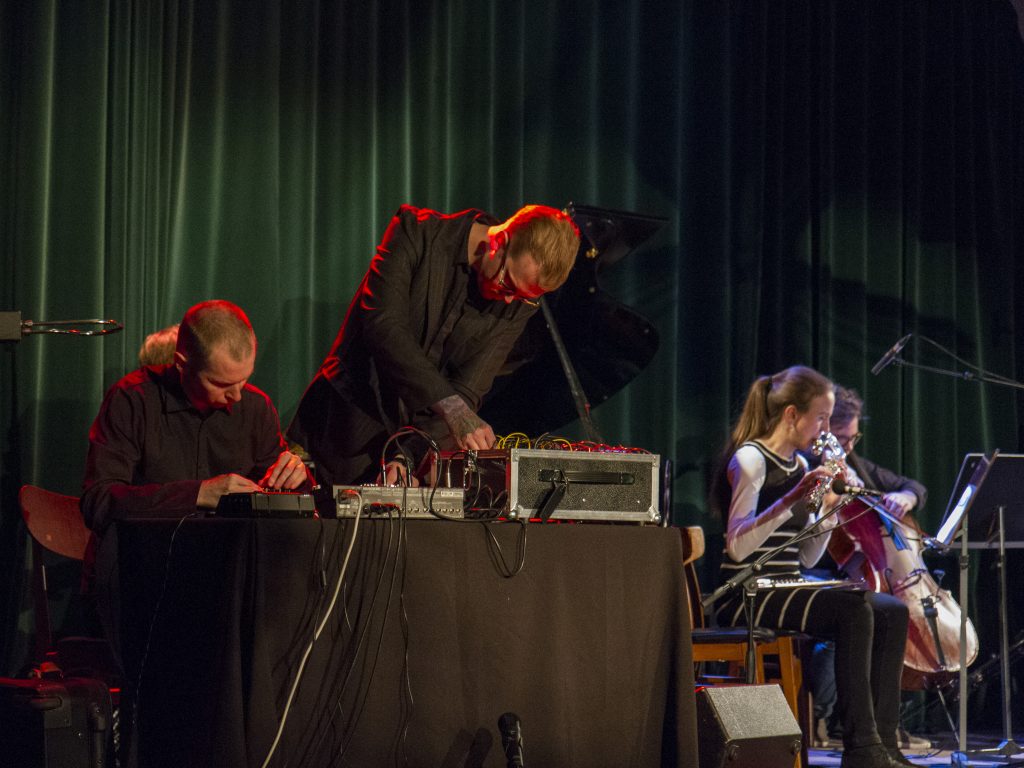The festival Nordic Music Days has been arranged since 1888, and we are proud to say that it is one of the oldest and well respected festivals for contemporary classical music in the world. Our festival is unique in the respect that it is arranged by the composers themselves. Historically each year one of our members, the national societies of composers, arranged the festival on behalf of the Council of Nordic Composers in their home country. From 2024, the festival will take place every second year and is managed by DKF on behalf of all the councils member societies.
You can read more about the current or upcoming festival at the festival’s own website.
History
(From wikipedia)

From the mid-nineteenth century, at regular intervals, song festivals were arranged where choirs from all over the North met. The repertoire was decidedly ‘national’ – one could say that when the Nordic countries were gathered there was a need to express national distinctiveness. But joint activities were arranged too, for example in 1929 when a choir of 1000 sang the Nordic cantata Song of the North, composed jointly by five composers – one from each Nordic country. The song festivals continued well into the first half of the twentieth century.
The first true “Nordic Music Days” was held in Copenhagen in 1888 and its main emphasis was on instrumental and orchestral music. This was to be a forum where Nordic composers could have their works performed, and the first festival presented works from Denmark, Norway and Sweden – among other ways in seven large-scale choral and orchestral concerts.
The next festivals were held in Stockholm in 1897, and in 1919 – again in Copenhagen, where among others Carl Nielsen, Jean Sibelius, Wilhelm Stenhammer and Johan Halvorsen conducted. The first time the festival was held in Helsinki was 1921, then it was held in Stockholm in 1927, in Helsinki again in 1932, and finally in Oslo in 1934. The Copenhagen 1938 festival was the last one before the outbreak of World War II.
After the war the Nordic composers’ societies joined forces to form the Nordic Council of Composers, which immediately after its establishment in 1946 assumed the main responsibility for Nordic Music Days. Since 1948 the festival has been held in turn in the Nordic capitals every other year. Until the 1970s the repertoire profile was still purely Nordic, but from 1974- 82 composers and works from a ‘guest country’ were invited: Poland in 1974, Canada in 1976, the GDR in 1978, the UK in 1980, and in 1982 France. After this it went back to being a festival exclusively for new Nordic music.
| Glasgow 2024 – Scotland | Helsinki 2008 – Finland | Oslo 1982 – Norway | København 1952 – Denmark |
| Reykjavík 2022 – Iceland | Norrköping 2007 – Sweden | Helsingfors 1980 – Finland | Helsingfors 1950 – Finland |
| Tórshavn 2021 – Faroe Islands | Reykjavík 2006 – Iceland | Stockholm 1978 – Sweden | Oslo 1948 – Norway |
| Bodø 2019 – Norway | Cph/Mmx/Hel 2004 – Denmark | Reykjavík 1976 – Iceland | Stockholm 1947 – Sweden |
| Helsinki 2018 – Finland | MAGMA, in Berlin 2002 – Norway | København 1974 – Denmark | København 1938 – Denmark |
| London 2017 – Sweden | Lahti, Turku, Helsinki 2000 – Finland | Helsingfors 1970 – Finland | Oslo 1934 – Norway |
| Reykjavík 2016 – Iceland | Stockholm 1998 – Sweden | Stockholm 1968 – Sweden | Helsingfors 1932 – Finland |
| København 2015 – Denmark | Reykjavík 1996 – Iceland | Reykjavík 1967 – Iceland | Stockholm 1927 – Sweden |
| Oslo 2014 – Norway | København 1994 – Denmark | Helsingfors 1964 – Finland | Helsingfors 1921 – Finland |
| Helsinki 2013 – Finland | ULTIMA, in Oslo 1992 – Norway | København 1962 – Denmark | København 1919 – Denmark |
| Stockholm 2012 – Sweden | Turku, Espoo, Helsinki 1990 – Finland | Stockholm 1960 – Sweden | Stockholm 1897 – Sweden |
| Reykjavík 2011 – Iceland | Stockholm 1988 – Sweden | Oslo 1958 – Norway | København 1888 – Denmark |
| København 2010 – Denmark | Reykjavík 1986 – Iceland | Helsingfors 1956 –Finland | |
| Oslo 2009 – Norway | København 1984 – Denmark | Reykjavík 1954 – Iceland |